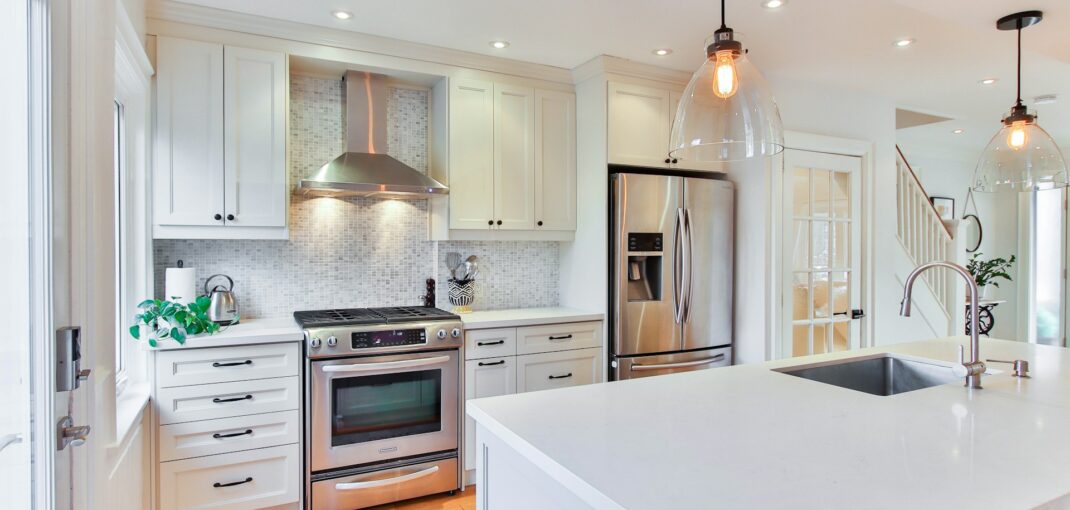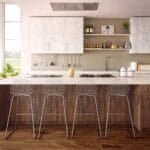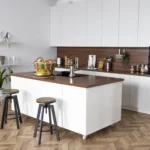Choosing the right material for your kitchen countertops is one of the most important decisions you’ll make when designing or remodeling your kitchen. The countertops are not just a functional space; they also play a significant role in the overall aesthetic of the room. At Stoneworks in Longview, TX, we understand the importance of selecting kitchen countertops that not only look great but also meet the demands of your lifestyle. Below, we explore the best kitchen countertop materials, discussing their pros and cons, to help you make an informed decision.
Quartz Countertops: The Modern Favorite
Quartz countertops have gained immense popularity in recent years, and for good reason. Made from engineered stone, quartz countertops are known for their durability and low maintenance. They are resistant to staining, scratching, and heat, making them an excellent choice for busy kitchens. Unlike natural stones, quartz is non-porous, which means it doesn’t require sealing and is highly resistant to bacteria and mold growth—a crucial factor in maintaining a hygienic kitchen environment.
Quartz countertops come in a wide range of colors and patterns, allowing you to customize your kitchen to match your personal style. Whether you prefer a sleek, modern look or a more traditional design, there’s a quartz countertop to suit your needs. While quartz is on the higher end of the price spectrum, its durability and versatility make it a worthwhile investment for many homeowners.
Granite: The Classic Natural Stone Countertop
Granite has long been a popular choice for kitchen countertops, and it continues to be a top contender in the market. This natural stone countertop material is revered for its stunning beauty and unique veining, which means no two granite slabs are identical. Granite is incredibly durable, resistant to heat, and, with proper sealing, resistant to staining as well. It can withstand the daily wear and tear of a busy kitchen, making it a practical option for many homes.
However, granite does require some maintenance to keep it looking its best. To prevent stains, it’s important to seal the surface regularly. Additionally, granite can be susceptible to scratching, so it’s advisable to use a cutting board when preparing food. Despite these minor maintenance requirements, granite remains a favorite for those seeking a natural stone countertop that adds a touch of elegance to their kitchen.
Marble: The Luxurious Choice
For those who value luxury and timeless beauty, marble countertops are an excellent option. Marble’s classic appeal and stunning veining make it a favorite among homeowners and designers alike. However, marble is a softer stone, which means it is more susceptible to scratching and staining compared to granite or quartz. It’s also less resistant to heat, so care must be taken when placing hot pots or pans on the surface.
To protect your marble countertop, regular sealing is essential. Additionally, using a cutting board and being mindful of acidic substances like lemon juice or vinegar, which can etch the surface, will help maintain its pristine appearance. While marble requires more care, its unmatched beauty often makes it worth the extra effort for those who desire a luxurious kitchen space.
Laminate Countertops: The Budget-Friendly Option
Laminate countertops are a popular choice for those on a budget, offering a wide range of colors and patterns to suit any kitchen design. Laminate is made from layers of plastic bonded to particleboard, making it a lightweight and affordable option. While laminate countertops are resistant to stains and relatively easy to clean, they are not as durable as other materials. They can be prone to scratching and are not resistant to heat, so using trivets and cutting boards is essential.
One of the main advantages of laminate countertops is their cost-effectiveness. They allow homeowners to achieve the look of more expensive materials, such as granite or wood, at a fraction of the price. However, if durability and longevity are your primary concerns, laminate may not be the best choice for your kitchen countertops.
Butcher Block: The Warm, Natural Option
Butcher block countertops bring a warm, rustic charm to any kitchen. Made from strips of wood glued together, butcher block is a natural, renewable material that adds a unique aesthetic to the space. This type of countertop is particularly popular among those who enjoy cooking, as the surface can double as a cutting board. However, to prevent damage, it’s recommended to use a separate cutting board to avoid scratching and staining the wood.
One of the drawbacks of butcher block countertops is their susceptibility to water damage and staining. Regular oiling with mineral oil is necessary to keep the wood hydrated and prevent it from drying out and cracking. Additionally, butcher block countertops are less resistant to heat, so using trivets is a must. While they require more maintenance, many homeowners appreciate the natural beauty and warmth that butcher block countertops bring to their kitchens.
Solid Surface: The Versatile Contender
Solid surface countertops, such as Corian, offer a seamless and uniform look that appeals to many modern homeowners. Made from a blend of acrylic and natural minerals, solid surface countertops are resistant to stains and easy to clean. They are also non-porous, making them a hygienic choice for kitchen countertops.
One of the advantages of solid surface countertops is their versatility. They can be fabricated to include integrated sinks and backsplashes, creating a sleek, continuous look. Solid surface countertops are also repairable; minor scratches and burns can be sanded out, restoring the surface to its original condition. However, they are not as heat-resistant as natural stones like granite or quartz, so caution is needed when placing hot items on the surface.
Stainless Steel: The Professional’s Choice
Stainless steel countertops are a staple in commercial kitchens due to their durability and resistance to heat and stains. This material is perfect for those who prioritize function over form. Stainless steel countertops are non-porous, making them incredibly easy to clean and maintain. They are also resistant to bacteria, which is why they are favored in environments where hygiene is paramount.
While stainless steel is practical, it does have its drawbacks. It is prone to scratching and can show fingerprints and smudges easily. Additionally, stainless steel can be noisy and cold to the touch, which may not appeal to everyone. However, for those who seek a sleek, industrial look and the durability that comes with it, stainless steel is an excellent choice for kitchen countertops.
Choosing the Right Material for Your Kitchen
Selecting the best material for your kitchen countertops depends on various factors, including your budget, lifestyle, and aesthetic preferences. Whether you prioritize durability, ease of maintenance, or the natural beauty of stone, there’s a countertop material to suit your needs. At Stoneworks in Longview, TX, we offer a wide range of kitchen countertop materials, from quartz and granite to laminate and butcher block, ensuring that you find the perfect fit for your home.







